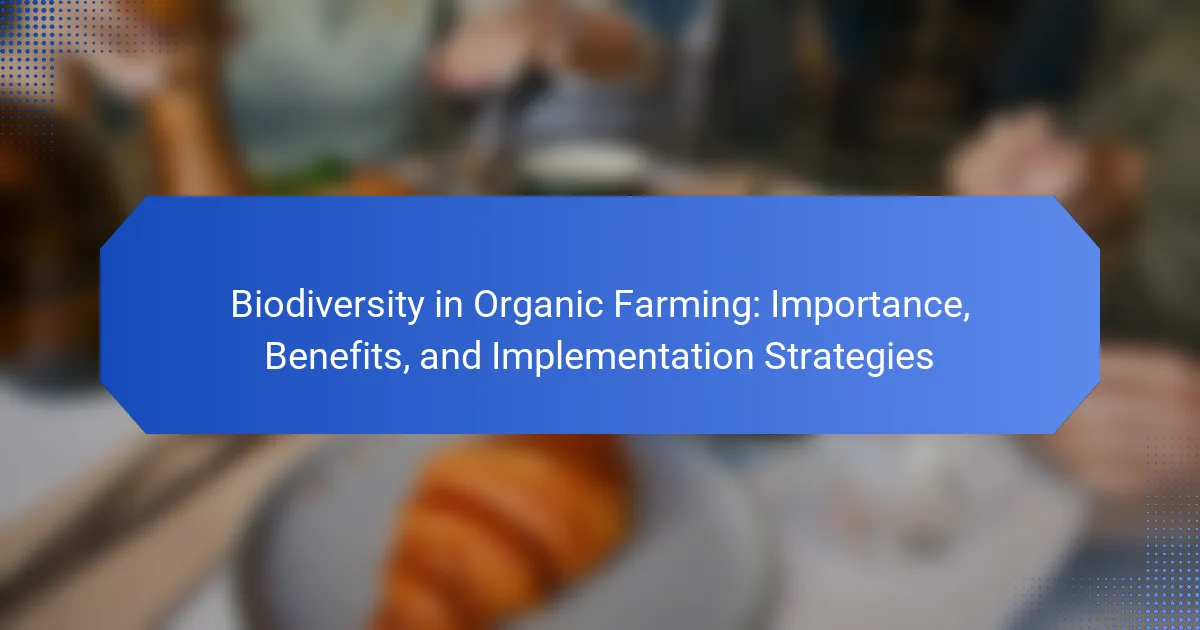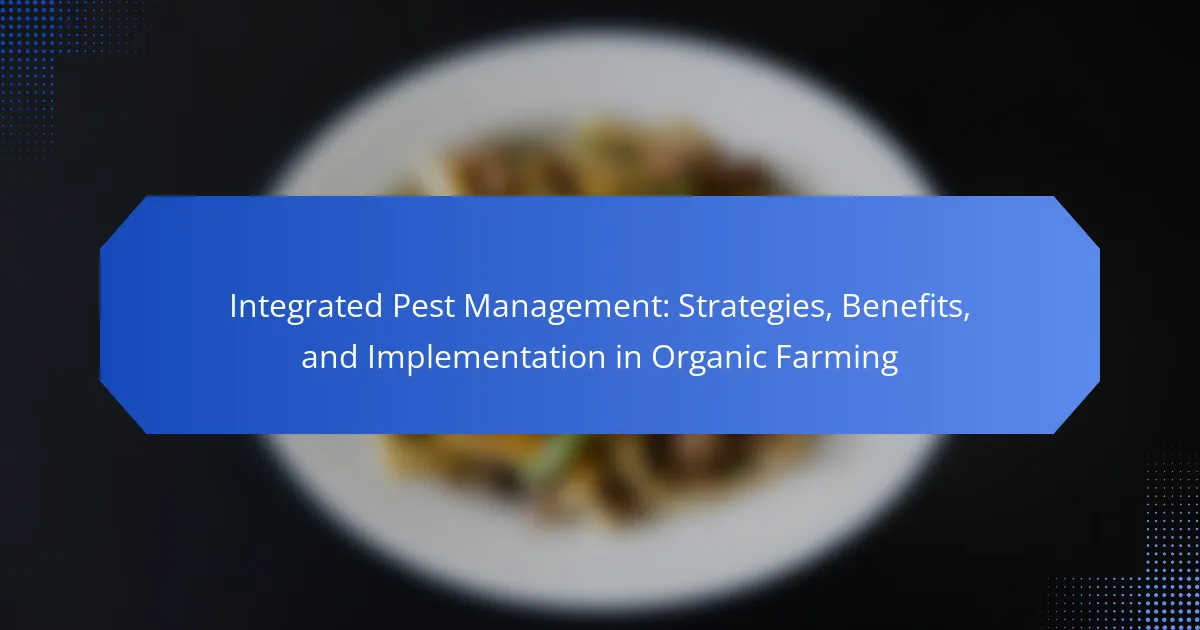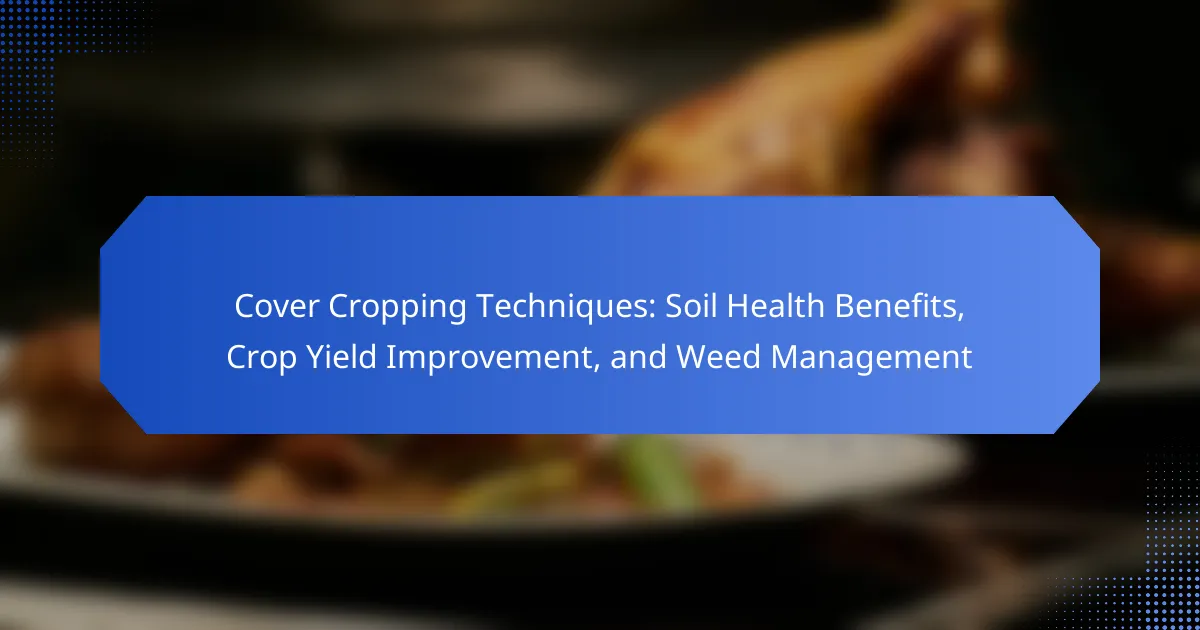Organic seed selection is the process of choosing seeds that adhere to organic farming standards, emphasizing non-GMO seeds free from synthetic pesticides and fertilizers. This practice aims to enhance biodiversity and promote sustainable agriculture by selecting seeds from plants adapted to local environments. Key benefits of organic seed selection include improved soil health and crop resilience, supported by rigorous certification processes to ensure compliance with organic standards. Best practices involve using certified organic seeds, prioritizing heirloom and open-pollinated varieties, and assessing local conditions for optimal growth. Regular evaluation of seed performance and collaboration with agricultural experts further enhance the effectiveness of organic seed selection strategies.

What is Organic Seed Selection?
Organic seed selection is the process of choosing seeds that are grown and harvested according to organic farming standards. This method emphasizes the use of non-GMO seeds that are free from synthetic pesticides and fertilizers. Organic seed selection aims to preserve biodiversity and promote sustainable agricultural practices. It often involves selecting seeds from plants that have adapted to local conditions. Research shows that using organic seeds can enhance soil health and improve crop resilience. Organic seeds must be certified by recognized organizations to ensure compliance with organic standards. This certification process includes rigorous testing and verification of seed sources.
Why is Organic Seed Selection important for sustainable agriculture?
Organic seed selection is important for sustainable agriculture because it promotes biodiversity and enhances soil health. Organic seeds are bred for resilience against pests and diseases, reducing the need for chemical interventions. This practice supports local ecosystems by encouraging natural pest predators. Furthermore, organic seeds often adapt better to local conditions, improving crop yields sustainably. Studies show that organic farming can increase soil organic matter by 15-25%, which is crucial for long-term soil fertility. By using organic seeds, farmers contribute to a more sustainable agricultural system that prioritizes environmental health and food security.
What defines organic seeds compared to conventional seeds?
Organic seeds are defined as seeds produced without synthetic fertilizers, pesticides, or genetically modified organisms (GMOs). They are cultivated under strict standards set by organic certification bodies. These standards promote biodiversity and ecological balance. In contrast, conventional seeds may be treated with synthetic chemicals and can be genetically engineered. The organic seed production process emphasizes soil health and sustainable farming practices. Research indicates that organic farming can enhance soil quality and promote healthier ecosystems. Studies show that organic seeds often lead to crops with higher nutritional value.
How does organic seed selection impact biodiversity?
Organic seed selection enhances biodiversity by promoting genetic diversity within crops. It encourages the use of heirloom and diverse seed varieties. These varieties are better adapted to local conditions and pests. This adaptability leads to more resilient ecosystems. Research shows that diverse crops can improve soil health and reduce disease spread. A study by the Rodale Institute found that organic farming practices increase soil microbial diversity. Increased microbial diversity supports healthier plant growth. Thus, organic seed selection directly contributes to maintaining and enhancing biodiversity in agricultural systems.
What criteria should be considered in Organic Seed Selection?
Criteria for organic seed selection include genetic diversity, disease resistance, and adaptability to local conditions. Genetic diversity ensures a range of traits, which can enhance resilience. Disease resistance is crucial for reducing pesticide use and improving yield. Adaptability to local conditions helps seeds thrive in specific climates and soil types. Additionally, selecting seeds that are certified organic guarantees compliance with organic farming standards. Research indicates that using locally adapted seeds can increase crop productivity by up to 20%.
What are the essential attributes of high-quality organic seeds?
High-quality organic seeds possess several essential attributes. These seeds are non-GMO, ensuring they are not genetically modified. They are produced without synthetic pesticides or fertilizers, promoting environmental sustainability. High-quality organic seeds also exhibit high germination rates, typically exceeding 85%. They are adapted to local growing conditions, enhancing their resilience and performance. Additionally, these seeds are often open-pollinated, allowing for natural reproduction and biodiversity. Furthermore, they are sourced from reputable suppliers who adhere to organic certification standards. This ensures traceability and quality assurance in the seed supply chain.
How do environmental conditions influence seed selection?
Environmental conditions significantly influence seed selection. Factors such as temperature, moisture, and soil type affect seed viability and growth. For instance, certain seeds thrive in warmer climates, while others prefer cooler temperatures. Moisture levels determine germination rates and seedling establishment. Soil type impacts nutrient availability and root development. Research shows that selecting seeds adapted to local conditions enhances crop resilience. A study by the University of California found that region-specific seed varieties improve yield by 20% in adverse conditions. Therefore, understanding environmental conditions is crucial for effective seed selection.
What benefits does Organic Seed Selection provide?
Organic Seed Selection provides numerous benefits for sustainable agriculture. It enhances biodiversity by promoting a variety of plant species. This selection process leads to healthier crops that are more resilient to pests and diseases. Organic seeds are often adapted to local growing conditions, improving yield potential. They also contribute to soil health by supporting beneficial microorganisms. Additionally, using organic seeds reduces the risk of chemical contamination in food. Studies show that organic farming can yield comparable results to conventional methods while fostering environmental sustainability.
How does Organic Seed Selection contribute to soil health?
Organic seed selection enhances soil health by promoting biodiversity and resilience in ecosystems. It encourages the growth of diverse plant species, which improves soil structure and nutrient availability. Healthier plants lead to better root systems, preventing soil erosion and enhancing water retention. Additionally, organic seeds are often bred for disease resistance, reducing the need for chemical inputs that can degrade soil quality. Research indicates that organic farming practices can increase soil organic matter by 25% compared to conventional methods. This increase supports a thriving soil microbiome, essential for nutrient cycling and plant growth.
What are the economic advantages of using organic seeds?
Using organic seeds provides several economic advantages. Organic seeds often lead to higher market prices due to increasing consumer demand for organic products. Farmers can benefit from premium prices, which can improve their profit margins. Additionally, organic farming practices can reduce the need for synthetic fertilizers and pesticides, lowering input costs. This results in overall cost savings for farmers.
Studies show that organic farming can yield comparable or even higher returns per acre than conventional farming. For example, a study published in the journal “Agricultural Systems” reported that organic farms can achieve up to 30% higher profitability. Furthermore, organic seeds contribute to soil health, leading to improved long-term productivity and sustainability.
Investing in organic seeds can also enhance farm resilience, allowing farmers to adapt better to market fluctuations. This adaptability can lead to more stable income over time. Overall, the economic advantages of using organic seeds are substantial and supported by research.

What best practices should be followed in Organic Seed Selection?
Best practices in organic seed selection include choosing seeds that are certified organic. Certified organic seeds ensure compliance with USDA standards. Selecting seeds adapted to local conditions enhances growth and resilience. It is important to prioritize heirloom and open-pollinated varieties for biodiversity. Testing soil health prior to planting aids in selecting appropriate seed types. Avoiding genetically modified organisms (GMOs) is crucial for maintaining organic integrity. Lastly, sourcing seeds from reputable suppliers ensures quality and viability. These practices contribute to successful organic farming and sustainable agriculture.
How can farmers ensure they choose the right organic seeds?
Farmers can ensure they choose the right organic seeds by selecting seeds that are certified organic. Certified organic seeds are produced according to USDA standards. This guarantees that the seeds are free from synthetic pesticides and fertilizers. Farmers should also consider the seed variety that is best suited to their specific climate and soil conditions. Selecting varieties with proven performance in local conditions increases the chances of successful crops. Additionally, farmers should review seed catalogs and consult with local agricultural extension services for recommendations. Researching seed suppliers’ reputations and customer reviews can provide insights into seed quality. Testing soil health and compatibility with specific seed types can further guide the selection process.
What steps are involved in evaluating seed sources?
Evaluating seed sources involves several key steps. First, identify reputable seed suppliers. This can include organic certification and customer reviews. Second, assess seed quality by examining germination rates and purity levels. High germination rates indicate robust seeds. Third, review the seed source’s history and reliability. Suppliers with a proven track record are more trustworthy. Fourth, consider the adaptability of seeds to local growing conditions. Seeds suited to the environment perform better. Lastly, check for availability of necessary documentation, such as seed testing results. This ensures transparency and quality assurance in the seed sourcing process.
How can farmers assess the germination rates of organic seeds?
Farmers can assess the germination rates of organic seeds by conducting germination tests. This involves taking a sample of seeds and placing them in a controlled environment. The seeds should be kept moist and at the appropriate temperature for germination. Farmers typically use a paper towel or soil medium for this purpose. After a set period, usually between 7 to 14 days, farmers count the number of seeds that have germinated. The germination rate is calculated by dividing the number of germinated seeds by the total number of seeds tested, then multiplying by 100. For example, if 80 out of 100 seeds germinate, the germination rate is 80%. This method is reliable and commonly used to ensure seed viability before planting.
What common mistakes should be avoided in Organic Seed Selection?
Common mistakes to avoid in organic seed selection include choosing non-organic seeds. Using non-organic seeds contradicts organic farming principles. Another mistake is selecting seeds without considering local climate conditions. Seeds must be suited to the growing environment for optimal yields. Failing to research seed varieties is also a common error. Different varieties have unique traits that affect growth and harvest. Ignoring disease resistance in seed selection can lead to crop failure. Selecting seeds without understanding their growth requirements is detrimental. Lastly, not considering the source of seeds can result in poor quality. Always choose reputable suppliers to ensure seed integrity.
What pitfalls do inexperienced farmers face when selecting seeds?
Inexperienced farmers face several pitfalls when selecting seeds. One major issue is lack of knowledge about local climate and soil conditions. This can lead to choosing seeds that are not suited for their environment. Another pitfall is not understanding seed quality and viability. Poor quality seeds can result in low germination rates and weak plants. Inexperienced farmers may also overlook the importance of disease resistance in seed selection. Choosing seeds without this trait can lead to crop failure. Additionally, they might ignore the benefits of crop rotation and diversity. This can make their fields more susceptible to pests and diseases. Lastly, inexperienced farmers may fail to consider the cost-to-benefit ratio of seeds. Investing in cheaper seeds can lead to higher long-term costs due to poor yields.
How can incorrect seed selection affect crop yield?
Incorrect seed selection can significantly reduce crop yield. Choosing seeds that are not suited to the local climate or soil conditions can lead to poor germination rates. Additionally, seeds with low disease resistance may result in increased crop losses. Inadequate seed quality can also hinder growth and development. Research indicates that using the wrong seed variety can decrease yields by up to 50%. Furthermore, improper seed selection can lead to inefficient resource use, such as water and fertilizer. This ultimately affects the overall productivity of the farm.

How can one effectively implement Organic Seed Selection practices?
To effectively implement Organic Seed Selection practices, begin by choosing seeds that are certified organic. Certified organic seeds ensure compliance with organic farming standards. Next, consider the local climate and soil conditions when selecting varieties. This ensures better adaptation and higher yields. Additionally, prioritize heirloom and open-pollinated varieties for genetic diversity. These varieties promote resilience and sustainability in farming systems.
Regularly assess seed performance through field trials. This provides data on germination rates and disease resistance. Collaborate with local agricultural extension services for guidance on best practices. They offer valuable resources and support for organic seed selection. Finally, maintain thorough records of seed sources and performance. This practice aids in continuous improvement and informed decision-making.
What resources are available for learning about Organic Seed Selection?
Resources for learning about Organic Seed Selection include books, online courses, and agricultural extension services. Books such as “Seed to Seed” by Suzanne Ashworth provide comprehensive guidance on seed saving and selection. Online platforms like Coursera offer courses focused on organic farming practices, including seed selection. Additionally, local agricultural extension services often provide workshops and materials tailored to organic farming. The USDA also publishes resources on organic seed certification and selection practices. These sources are credible and widely used by both novice and experienced organic farmers.
How can community support enhance the seed selection process?
Community support can enhance the seed selection process by providing shared knowledge and resources. Local farmers can exchange experiences about seed performance in specific climates. This collaboration leads to more informed choices that suit local conditions. Community members can also pool resources to access diverse seed varieties. This increases the genetic diversity available for selection. Furthermore, community support fosters collective decision-making. It encourages the adoption of best practices in organic seed selection. Research shows that community engagement improves overall agricultural sustainability. Engaging with local agricultural extension services can also provide valuable insights.
What practical tips can improve Organic Seed Selection outcomes?
Select seeds that are certified organic to ensure they meet organic standards. Research local climate conditions and choose varieties suited for your region. Consider disease resistance when selecting seeds to reduce the need for chemical interventions. Look for heirloom or open-pollinated varieties for better adaptability and biodiversity. Test soil health before planting to understand nutrient needs. Rotate crops annually to prevent soil depletion and pest buildup. Use companion planting to enhance growth and deter pests naturally. Keep records of seed performance to inform future selections and improve outcomes.
How can farmers create a customized seed selection plan?
Farmers can create a customized seed selection plan by assessing their specific growing conditions and crop requirements. They should evaluate soil type, climate, and pest pressures. Selecting seeds that are well-adapted to these conditions increases the chances of successful growth. Farmers must also consider their market demands and personal preferences for crop varieties. Researching seed performance data can provide insights into yield potential and disease resistance. Consulting with local agricultural extension services can further guide farmers in making informed decisions. This tailored approach enhances productivity and sustainability in organic farming practices.
What role does ongoing education play in successful seed selection?
Ongoing education is crucial for successful seed selection. It equips growers with the latest research and techniques. Knowledge about seed genetics and environmental factors enhances decision-making. Continuous learning helps in understanding pest and disease resistance. It also informs about sustainable practices and organic certifications. Educational resources include workshops, online courses, and agricultural extension programs. These resources provide practical insights and field experiences. Studies indicate that educated farmers achieve higher yields and better crop quality.
Organic Seed Selection refers to the process of choosing seeds that adhere to organic farming standards, emphasizing non-GMO varieties free from synthetic pesticides and fertilizers. This article explores the importance of organic seed selection for sustainable agriculture, highlighting its role in promoting biodiversity, enhancing soil health, and improving crop resilience. Key criteria for selecting organic seeds include genetic diversity, disease resistance, and adaptability to local conditions, while best practices involve sourcing certified organic seeds and assessing environmental factors. The economic advantages and practical tips for successful implementation are also discussed, providing a comprehensive understanding of organic seed selection’s benefits and methodologies.



